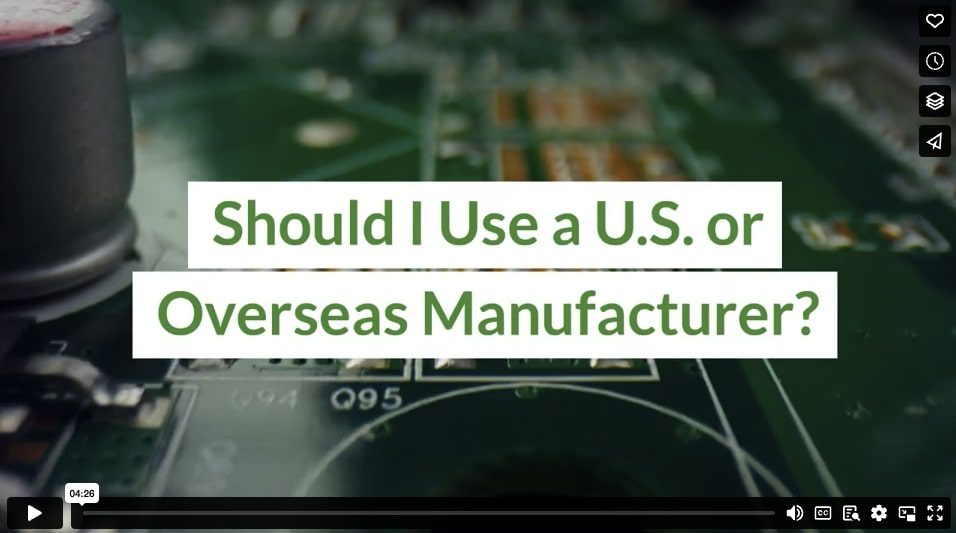Ah, the age-old question: Should you manufacture electronics in the U.S. or venture overseas? This choice goes beyond mere cost comparisons, weaving in quality, speed, and how each aligns with your business vision. Let’s break it down, chip by chip, and see what might work best for you.

(usertrmk/Freepik)
Cost vs. Speed
Manufacturing overseas might save you money, but it’s a matter of patience. You’re looking at longer shipping times and potential delays. On the flip side, making your electronics in the U.S. might mean higher upfront costs, but you benefit from quicker turnaround times and easier communication.
Quality and Control
When you manufacture things closer to home, you can keep an eye on the quality. Visiting a local factory is easier than flying halfway around the world. Overseas manufacturers may not adhere to the same quality standards. If you choose an overseas manufacturer, you should establish strong relationships and effective oversight to ensure your standards are met.
Design and Tech
The U.S. leads in advanced PCB design and engineering capabilities. With a strong focus on R&D, American manufacturers appeal to specialized industries requiring cutting-edge technology. China has also made significant investments in technology and infrastructure, but it’s yet to match the U.S.’s level of innovation.
Turnkey Solution
In the U.S., you get turnkey services from manufacturers. They handle everything from sketching out the design to sending off the final product, cutting out the hassle of managing several partners. China, on the other hand, excels in crafting particular items like laptops and cellphones, thanks to a streamlined system that makes finding parts and assembly efficient.
Speed to Market
U.S. manufacturing delivers quickly. For those needing their products in a hurry, the U.S. reduces wait times with its shorter shipping paths for domestic orders. While China is great at producing large quantities efficiently, international shipping can introduce delays.
Intellectual Property Protection
Protecting your intellectual property is crucial in the electronics industry. With U.S. manufacturing, you can be confident that robust legal frameworks and stringent IP laws will safeguard your innovations. While many countries are improving their IP laws, the risks of imitation and infringement can be higher when manufacturing overseas.
Customization and Flexibility
Manufacturing products nearby gives you more freedom to make changes and adjust to what you need. In the U.S., companies are usually open to making small quantities of electronics or changing designs quickly. This is because they’re closer to you, and it’s easier to talk to them. This flexibility can really help businesses that want to make special products or quickly change their designs based on what customers want.
Supply Chain Stability
It’s no secret that recent global events have exposed vulnerabilities in international supply chains. Manufacturing domestically can mitigate these risks, ensuring more stable supply lines and reducing the likelihood of disruptions. While overseas manufacturing can benefit from cost efficiencies, the potential for delays and complications can affect inventory levels and lead to lost sales.
Brand Image and Loyalty
Choosing to manufacture in the U.S. can deepen ties with the community and improve how people see your business. Nowadays, customers are keen on supporting businesses that benefit their local economy. If you promote your products as “Made in the USA,” it can click with your audience’s values and make them more loyal to your brand.
Customer Support and Relationships
When you opt for U.S. manufacturing, dealing with product gaps or any issues gets easier. You’re in similar time zones to your EMS PCBA provider, which means quicker responses and fixes for your business. It also means you can quickly adapt to market trends by working together with your vendor to manufacture new products.
Environmental Footprint
Choosing U.S. manufacturing can lead to a smaller environmental footprint compared to shipping products across the globe. Local production often means shorter transportation distances for both raw materials and the finished products, leading to lower carbon emissions. Electronic companies looking to enhance their sustainability practices and appeal to eco-conscious consumers should find it more suitable than overseas electronic manufacturing.
Security
Producing electronics in the U.S. adds an extra layer of security for sensitive or expensive items. Sticking to domestic production, businesses cut down on risks that come with lengthy and intricate supply chains, which are often open to theft, tampering, or spying. This kind of protection matters a lot for industries like defense, health care, and banking, where keeping electronic parts and systems secure is non-negotiable.
Conclusion
While the choice between U.S. and overseas manufacturing may depend on your product, budget, and speed needs, it’s clear you gain more with U.S. manufacturing. The advantages of domestic production—security, speed, and quality—make it a strong option for those seeking the best.
Video
Infographic
Deciding whether to manufacture electronics in the U.S. or overseas goes beyond cost—it involves considering quality, speed, and alignment with your business vision. Learn from this infographic to help you choose the right manufacturer.


